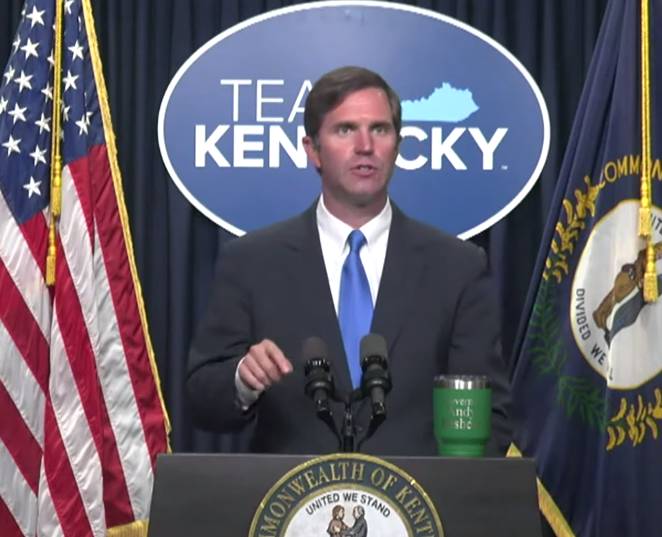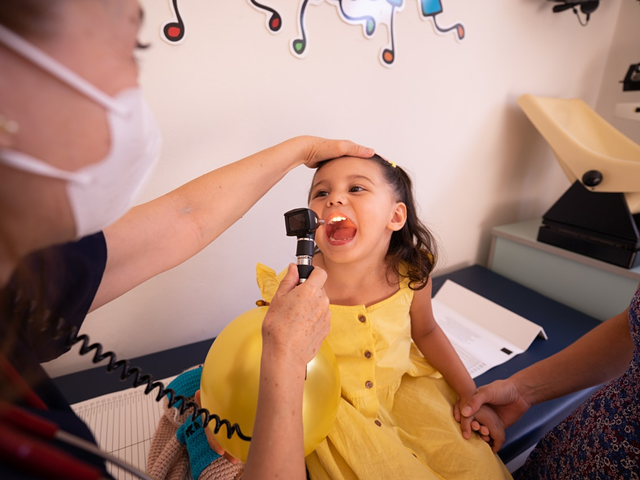With the coronavirus crisis only getting worse in Kentucky, Gov. Andy Beshear signed an executive order Tuesday to require masks in all schools and child care settings.
The mask mandate is effective immediately and applies to indoor areas within all educational settings from pre-kindergarten through 12th grade.
Beshear said during an Aug. 10 briefing that with the recent exponential growth in statewide COVID-19 cases, hospitalizations and ICU admissions, Kentucky health officials expect the Commonwealth to reach a somber turning point soon.
"Without intervention, at the rate we are currently at, we expect to have the most Kentuckians hospitalized due to COVID in two weeks than we have had at any time during this pandemic," Beshear said.
Kentucky's COVID-19 positivity rate has risen to 11.05%, the highest the state has seen since January (the positivity rate is the number of people who test positive out of all coronavirus tests performed). It was 9.77% on Aug. 2 and 1.79% in June.
“This is the fastest and steepest rise in cases of the entire pandemic. We had a 43% increase in hospitalized COVID cases in Kentucky in one week,” Dr. Steven Stack, commissioner for the Kentucky Department for Public Health, said. “We had a 32% increase in the number of hospitalized COVID patients in the intensive care units in one week. We had a 61% increase in number of COVID-19 patients on a ventilator in just one week. At this rate, in two weeks we will blow past our previous peaks."
Beshear's frustration with the ongoing pandemic was evident as his tone oscillated between pleading and anger throughout the briefing.
"Remember, we've lost over 7,300 Kentuckians. That's more than any two, maybe any three wars in our history put together. This is killing our people," Beshear said. "And to everyone out there that isn't willing to do your part, people around you are dying — more than you have ever seen in your lifetime."
Due to this summer's COVID-19 surge — largely driven by the highly transmissible Delta variant — Kentucky overwhelmingly is considered a high-risk state by local and national health officials, with 119 of 120 counties being labeled as "substantial risk" or "high risk" by the Centers for Disease Control and Prevention (The CDC lists all counties surrounding Cincinnati both in Ohio and Kentucky as being "high" or "substantial" risk). Beshear said that on Monday, there were 2,500 new COVID-19 cases, 1,251 hospitalizations, 339 ICU admissions and 168 people on ventilators. The numbers have been rising and compounding since June.
Beshear acknowledged that some state residents continue to ignore health officials' warnings about the virus but added that overcrowding in healthcare facilities could mean that people don't receive the level of care they need in time to be effective.
"You can not believe in COVID, but if you or your loved one needs an ICU bed and they're filled, then your failure to do the right thing could result in the loss of a life that you care so deeply about," Beshear implored.
In a statement, Dr. Crystal Miller, director of the WEDCO District Health Department, said the Delta variant has created some of the greatest challenges local hospitals have faced since the start of the pandemic.
“We had the highest COVID admission rate in one of our local hospitals today that we’ve seen this entire pandemic,” Miller said. “The COVID unit is full. Our local hospital CEO told me that his day begins and ends with texts from other CEOs around Kentucky asking if there are beds available to transfer patients. This is the most concerning thing that I have been told since the pandemic began.”
Beshear said that he signed the executive order for masking in schools with support from the Kentucky Chamber and healthcare personnel across the state. In previous addresses, Beshear had largely dismissed statewide mask mandates unless the Delta situation became dire.
The order notes that on Aug. 6, the state reported 525 new COVID-19 cases in people ages 18 and younger.
The masking order for Kentucky schools includes the following:
* All individuals – all teachers, staff, students and visitors – must cover their nose and mouth with a face covering when indoors in all public and private preschool, Head Start, elementary, middle and high schools (preschool through grade 12) in Kentucky, including but not limited to inside of vehicles used for transportation such as school buses, regardless of vaccination status; and
* All staff, visitors and children ages 2 and older who are able to wear a face covering must cover their nose and mouth with a face covering when indoors in all child care settings in Kentucky, regardless of vaccination status.
There are exceptions to the mandate, such as having certain disabilities, while eating, or when wearing a mask would present a work safety risk.
Dr. Scottie B. Day, physician-in-chief at UK HealthCare’s Kentucky Children's Hospital in Lexington, said during the briefing that though children hadn't been hospitalized in large numbers with the original strain of COVID-19, things are different now. He said that pediatric hospitalizations have increased week over week and pediatric COVID-19 deaths are twice the number of pediatric flu deaths reported by the CDC between 2019 and 2020.
"Kids, we think of as being healthier, (but) kids are not immortal, and it should be rare that a child should need to go to the hospital. So the fact that we've had a few hundred die is too many, way too many," Day said. "As the adult surges rise, the children's surges rise."
Day and Beshear both stressed COVID-19 vaccinations to help protect children and slow the spread of the deadly Delta variant across Kentucky. Day said that vaccinations are available for other infectious diseases like polio and measles, and coronavirus vaccines are necessary for children and the adults around them, too. COVID-19 vaccines currently are authorized for people ages 12 and older, and medical experts say these lessen the severity of COVID-19 symptoms and transmission.
Day also warned that COVID-19 is causing additional health complications.
"(Along with the COVID-19 surge), we're seeing an unseasonable spike in other respiratory illnesses. At children's hospitals both here and at Louisville, we're seeing bed spaces being taken up by a variety of illnesses that typically we would see only in the wintertime," Day said. "I'm the first one to say that in-person learning is so important, but as we know, we need to protect our children so that we don't end up, as we've talked about from the American Academy of Pediatrics, schools cancelling. We need to keep our children safe."
Many area schools are adopting mask requirements, including Cincinnati Public Schools.
The Delta variant of the coronavirus largely has been responsible for the sharp uptick in cases, hospitalizations and deaths, and scientists warn that this strain is much more dangerous than the original virus. People infected with Delta carry 1,000 times more of the virus, which makes it easier to transmit among others when speaking, singing, sneezing or breathing hard, particularly within indoor areas. Health experts say that Delta is more than twice as easy to spread as the first strain.
Unvaccinated individuals are at the highest risk for severe infection and substantial health issues from coronavirus, experts say, though some vaccinated individuals have also become infected due to Delta's highly contagious nature. Symptoms and rates are less severe in individuals who are fully vaccinated with a Pfizer, Moderna or Johnson & Johnson (J&J) COVID-19 vaccine, though. According to the CDC, a “fully vaccinated” person is one who is two weeks past their second dose of a two-dose vaccine (Pfizer and Moderna) or two weeks after a single-dose vaccine (J&J).
Health officials have long said that a combination of vaccinations and masking will help slow the highly infectious Delta variant of the coronavirus. In July, the CDC recommended that both unvaccinated and vaccinated individuals wear face masks, especially indoors and in regions of great virus transmission or low vaccination. But as vaccinations have plateaued and Ohio and Kentucky rescinded their coronavirus safety protocols in early June, the region's COVID-19 cases have increased.
"We are doubling the number of Kentuckians in the hospital for COVID every two weeks," Beshear said. "We are at an alarming place. Yesterday, we passed a grim milestone — more than half a million cases of COVID-19 in Kentucky."
Find COVID-19 information and Kentucky vaccine locations at kycovid19.ky.gov.
Watch Beshear's full briefing below.
Sign up for our weekly newsletters to get the latest on the news, things to do and places to eat delivered right to your inbox.
Follow us on Facebook, Twitter and Instagram.






